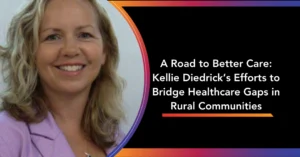
Kellie Diedrick’s journey to becoming the Vice President of Critical Access Hospitals for the North Region of ThedaCare Hospital is a testament to her dedication, resilience, and unwavering commitment to improving healthcare access in rural communities. Her story is one of leadership, innovation, and a heartfelt desire to make a difference in the lives of those she serves.
Kellie’s career at ThedaCare began in 2018 when she took on the role of System Lab Director. In this position, she provided support and leadership to all ThedaCare hospitals, ensuring that laboratory services were efficient and effective. However, it was during the COVID-19 pandemic that Kellie’s leadership truly shone. As the world grappled with the unprecedented challenges posed by the virus, Kellie spearheaded the vaccination efforts across ThedaCare hospitals. Her ability to coordinate and execute a comprehensive vaccination campaign did not go unnoticed, and she was soon invited to apply for the Vice President position.
As the Vice President of Critical Access Hospitals, Kellie oversees the day-to-day operations of hospitals in the North Region. Her responsibilities include ensuring the safety and quality of care, maintaining high levels of customer satisfaction, and providing oversight to other hospitals within the ThedaCare system. Kellie’s role is multifaceted, requiring her to balance administrative duties with a deep understanding of the unique challenges faced by rural healthcare providers.
One of the most pressing issues Kellie has encountered in her role is the state of rural transportation in the communities served by ThedaCare hospitals. While Waupaca County has made significant strides in addressing transportation needs thanks to the efforts of organizations like Feonix – Mobility Rising, many other counties lag behind. The lack of progressive infrastructure in these areas makes it difficult for residents to access essential services, including healthcare. Kellie describes it as a day-to-day struggle, with the majority of counties lacking the necessary resources to meet the transportation needs of their communities.
The impact of transportation barriers on healthcare outcomes cannot be overstated. When residents of rural areas lack reliable transportation, they are less likely to seek proactive healthcare. This can lead to a range of negative health outcomes, from untreated chronic conditions to delayed emergency care. Kellie shares a poignant anecdote to illustrate this point: “If a child living in a rural area has a medical emergency and is transported by ambulance at 8:30 PM, and both parents do not have a driver’s license, this causes issues with the child receiving a ride home as there is no public transportation after normal business hours for rural residents.” This example highlights the critical need for improved transportation services in rural areas.
To address these challenges, ThedaCare has implemented several initiatives aimed at improving rural transportation. One such initiative is the Community Health Action Team (CHAT), which has supported the Waupaca County Catch-a-Ride concept. This program, in partnership with Feonix – Mobility Rising, aims to expand employment rides to include medical rides within Waupaca County. Kellie emphasizes the importance of community involvement in these efforts, stating, “It takes the right people at the table to have the difficult conversations to make the work a bit easier.” Looking to the future, ThedaCare has ambitious plans to further improve rural transportation for patients. The organization is partnering with Feonix – Mobility Rising to provide 24/7 medical rides from emergency room discharges, procedures, and clinic visits for the Waupaca and New London Hospitals, beginning in January 2025. This initiative aims to ensure that residents of these rural areas have access to timely and reliable transportation, regardless of the time of day.
Kellie’s personal motivation to work on improving rural healthcare and transportation stems from her awareness of the severity of the demand for rides within the rural communities served by ThedaCare. She understands that transportation plays a crucial role in all aspects of social determinants of health, from access to healthy food options to employment opportunities. Her dedication to this cause is evident in her tireless advocacy for programs like WCCAR and her efforts to communicate their importance to hospital leadership.
When asked for advice to other healthcare leaders looking to tackle rural transportation issues, Kellie offers a simple yet powerful message: “Don’t reinvent the wheel. Talk with those who have completed the work previously for assistance, guidance, and support.” She also encourages rural residents to advocate for better transportation services in their communities by first recognizing that transportation is an issue. “I feel it’s an issue that many community members don’t see because it’s not on their radar,” she explains.
Reflecting on her accomplishments in improving rural transportation during her tenure at ThedaCare, Kellie remains humble. She acknowledges that much of the groundwork was laid before she assumed her current role. However, she takes pride in knowing that she advocates for the WCCAR program, communicates with hospital leadership about its importance, and serves as a voice for WCCAR and Feonix throughout the ThedaCare Hospital system.
The biggest lesson Kellie has learned in addressing these challenges is the importance of collaboration. “It’s a big lift. Stay in your lane, and don’t try to take on items you do not have experience with. Partnering with people who know how to tackle the issue is a much better solution than trying to take the problem on individually,” she advises. This insight underscores the value of teamwork and the need for healthcare leaders to leverage the expertise of others to achieve meaningful change.
Kellie’s journey from System Lab Director to Vice President of Critical Access Hospitals at ThedaCare is a story of dedication, leadership, and a heartfelt commitment to improving healthcare access in rural communities. Her efforts to address rural transportation challenges have had a profound impact on the lives of those she serves, and her story serves as an inspiration to healthcare leaders everywhere. Through collaboration, community involvement, and a deep understanding of the unique needs of rural residents, Kellie continues to make a difference in the world of healthcare.
